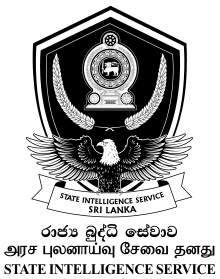State Intelligence Service (Sri Lanka)
This article has multiple issues. Please help improve it or discuss these issues on the talk page. (Learn how and when to remove these messages)
|
 | |
| Agency overview | |
|---|---|
| Formed | 1984 |
| Jurisdiction | Government of Sri Lanka |
| Headquarters | Colombo, Sri Lanka |
| Minister responsible | |
| Agency executive |
|
| Parent agency | Ministry of Defence |
The State Intelligence Service (SIS) is an intelligence agency of the Sri Lankan government.[1][2] It is the primary civilian intelligence agency of Sri Lanka and is responsible for both internal and external intelligence-gathering. It comes under the purview of the Ministry of Defence. The agency was originally named National Intelligence Bureau.
Role
[edit]SIS is responsible for the collection of intelligence about threats from internal and external sources to be used in the formulation of government policies and strategies. The duties carried out by the SIS are mainly categorised into,[3]
- Collection and analysis of information.
- Conducting undercover investigations.
- Conduct background checks on applicants recruited to sensitive institutions including the Armed Forces, Police and other selected state institutions.
- Issue threat assessment reports on VVIP and VIP security and governmental affairs.
- Conducting training programs for other institutions.
- Maintaining foreign relations on national security issues
Organisation
[edit]The SIS is part of the Ministry of Defence and is separate from the Police and Military intelligence but its staff consists of those from both police and military backgrounds. The SIS is led by a director general, traditionally from the Police but this was broken in 2019.[4][5]
History
[edit]Until 1984, the Sri Lanka Police were responsible for internal intelligence functions, first under the Special Branch, and later under the Intelligence Services Division.[citation needed] The perceived failure of the Intelligence Services Division during the riots of July 1983 led the Junius Jayawardene Government to re-evaluate the nation's intelligence network, and in 1984 the President set up a National Intelligence Bureau.[6] The new organisation combined intelligence units from the Army, Navy, Air Force and Police.[7] It was renamed the State Intelligence Service (SIS) in 2006.
Liberation Tigers of Tamil Eelam (LTTE) agents successfully infiltrated Sri Lankan government and military organisations resulting in the assassinations of several high-ranking military personnel, including Major Tuan Muthaliff and Colonel Tuan Meedin both of the Directorate of Military Intelligence, putting Sri Lankan intelligence services in a desperate condition.[citation needed] Under the Defence Secretary Gotabhaya Rajapaksa the intelligence agencies that were in desperate condition built-up a cohesive apparatus, which achieved significant success, including anti-LTTE operations overseas and the SIS played a huge role in the Fourth Ealam war. The SIS was involved in the dismantling of the large number of long-term sleeper cells planted by the LTTE in cities, helping Police track down criminals who were helping the LTTE for financial gain.[8][4]
In January 2015 the director of the SIS, Chandra Wakista, resigned following the presidential election, amid allegations of phone tapping of opposition politicians.[9] In March Nilantha Jayawardena was appointed as the SIS director.[10]
In December 2019 the newly elected president Gotabaya Rajapaksa appointed Brigadier Suresh Sallay, the former head of the Directorate of Military Intelligence, as the head of SIS. Sallay is the first director of the SIS to come from Military Intelligence instead of the Police.[5]
Directorates
[edit]- Directorate of Internal Intelligence
- Directorate of Foreign Intelligence
Operations
[edit]Kumaran Pathmanathan aka KP, who was involved in arms procurement for LTTE, was captured in Malaysia and moved to Sri Lanka via Thailand by this Agency.[11]
Recently some former LTTE members were captured from Southeast Asian countries and moved to Sri Lanka by State Intelligence Service and Military Intelligence Corps (Sri Lanka) of Sri Lanka Army together.[citation needed]
See also
[edit]References
[edit]- ^ Fuard, Asif (6 January 2008). "Slashing of security and the slaying of a politico". Sunday Times.
- ^ Jeyaraji, D. B. S. "Tigers sustain three-pronged strategy". The Nation.
- ^ "Performance Report 2019 - Ministry of Defence" (PDF). Retrieved 7 January 2021.
- ^ a b Moorcraft, Paul L. (19 March 2013). Total destruction of the Tamil Tigers : the rare victory of Sri Lanka's long war. Barnsley, South Yorkshire. ISBN 978-1-78383-074-9. OCLC 865026030.
{{cite book}}: CS1 maint: location missing publisher (link) - ^ a b "Sri Lanka intel chief sacked over Easter attacks". 9 December 2019. Retrieved 15 December 2019.
- ^ Williams, Clive (30 April 2019). "Public Sector Informant: Should heads roll after New Zealand and Sri Lankan intelligence failures?". Canberra Times. Retrieved 8 January 2022.
- ^ SRI LANKA - A Country Study
- ^ "Role of Intelligence Services". www.defence.lk. Archived from the original on 2013-09-13.
- ^ "Intelligence Chief Quits". Sri Lanka Guardian. Retrieved 9 August 2015.
- ^ "Nilantha appointed SIS chief". Sri Lankan Mirror. 2 March 2015. Retrieved 9 August 2015.
- ^ Athas, Iqbal (9 August 2009). "KP- he knows secrets that have never been told". Sunday Times.
